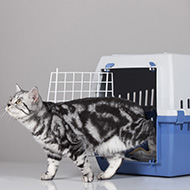Cat-friendly veterinary visits

Lucy discussed building resilience to veterinary visits in cats.
BVNA Congress kicked off today on Friday 7 October with a packed schedule of talks and workshops for veterinary nurses. One of these exciting sessions was a behavioural lecture titled 'MEE-OOOW!!! The cat at the vets', where Lucy Hoile shared her expertise on setting cats up for success in vet visits.
Lucy Hoile is a certified clinical animal behaviourist, and works exclusively with cats. She is a full member of the APBC and a certified member of the FABC. Holding an MSc in Companion Animal Behaviour Counselling, Lucy is a trustee for the ABTC and is registered as an ABTC Clinical Animal Behaviourist.
Exploring the theme of this year's congress – building resilience – Lucy opened her talk by explaining how preparing cats for veterinary trips is a case of building their resilience, giving them the necessary desensitisation and support needed to cope with the whole process of veterinary visits.
After outlining how cats' natural instincts impacts their behaviour in a veterinary settling, Lucy explained that getting cats comfortable at the vets is predominantly done during the socialisation period when a kitten is between two and eight weeks old.
Although this means that the responsibility for this is on the breeder, Lucy discussed how veterinary nurses are well-placed to help influence this, both in advising potential cat owners to choose a responsible and knowledgable breeder, and in supporting and advising breeders with the desensitisation process.
Getting kittens used to the things associated with veterinary visits, including cat carriers, thorough handling for health checks and veterinary instruments sets them up for success in for veterinary visits in their adult life.
One idea that Lucy shared was that it could be a great idea to offer socialisation visits to breeders, so they can bring the kittens into the practice for a positive experience. In these, the kittens could have the opportunity to experience the veterinary environment without anything to 'ruin' the experience for them.
Lucy signposted delegates to a socialisation chart created by Cats Protection, which takes breeders through all of the steps for socialisation, habituation and handling that kittens need.
Although in an ideal world, all kittens would have the opportunity to be properly desensitised to veterinary visits within the two to eight week window, but as Lucy acknowledged, this is not always possible due to the breeder's actions, and cats who have been acquired at an older age.
These cats already become stressed at veterinary visits, and it is a long process to desensitise them. Lucy suggested that the veterinary team can support owners by educating them on the various stressors, and suggesting that they identify which part of the process is particularly stressful in order to begin counter-conditioning.
Following this, Lucy shared some ideas for veterinary professionals to create a low-stress veterinary environment for cats, to minimise stress. She suggested separate waiting areas for cats, raised areas to keep cat carriers off of the ground, pheromonatherapy and educating owners on things such as keeping barriers between waiting cats, and not allowing other animals in the practice to interact with them/
For consult rooms, Lucy suggested having separate rooms for different species, having a non-slip table, giving the cat some control and element of choice and cat-friendly spaces with height.
Also highlighted was the need for low-stress handling, inviting the cat to approach, and allowing them some time to smell the people in the room.
In her conclusion Lucy reiterated the great positioning of veterinary nurses to foster cat-friendly veterinary visits, and urged delegates to be an advocate for cats within their practice.



 The Veterinary Medicines Directorate (VMD) is inviting applications from veterinary students to attend a one-week extramural studies (EMS) placement in July 2026.
The Veterinary Medicines Directorate (VMD) is inviting applications from veterinary students to attend a one-week extramural studies (EMS) placement in July 2026.